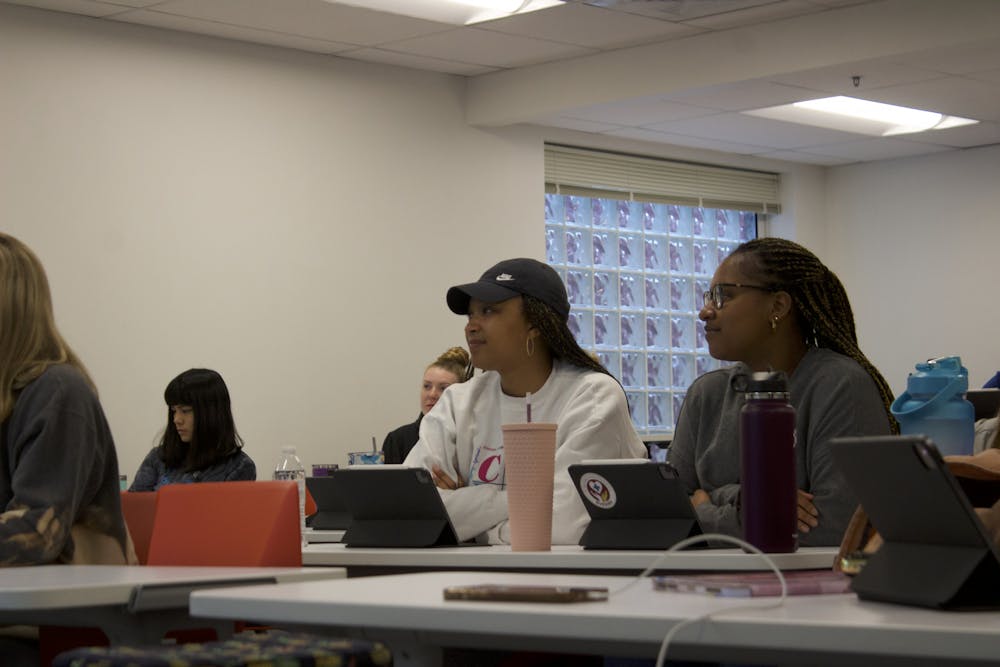Sophomore Maddie Xerras said she fell in love with the medical field at a young age when she would go with her father, who is a doctor, to his office. Nursing was perfect for Xerras because after only four years as an undergraduate, she could become a registered nurse — as opposed to going to medical school after college. She chose Elon because she loved the campus, the size of the school and was excited about the new nursing program.
“This year feels a lot more organized than it did last year,” Xerras said. “We have great resources and staff that we can always reach out to if we are struggling with something.”
Inaugural Department Chair of the Department of Nursing, Tiffany Morris, said that the major difference between the program’s second year and first year is the connection and relationship they’ve fostered within the program.
“I think there is a more broader acceptance of nursing as a presence on campus,” Morris said. “We've formed more relationships with our campus partners and have learned lessons including how we can help students navigate scheduling, registration and those kinds of things.”
According to Morris, there has been an increase in faculty and students in the department this year. The class of 2026 is up to 47 students, compared to 35 from the class of 2025 last year. The maximum number of students the Elon nursing department can seat for each grade level is 56.
The nursing program is very intensive at Elon as explained by Morris. Students pursuing their four-year Bachelor of Science in Nursing must complete all of Elon’s core requirements, nursing prerequisites and 65 credit-hour nursing curriculum — including 17 nursing courses and 540 total clinical hours.
“I feel like it’s definitely overwhelming in the sense of classes and keeping up with everything, but that is what nursing school is,” Xerras said. “Whenever I feel stressed, I try to remind myself that it will all be worth it and, in the next three years, I will have my nursing degree.”
According to Morris, all nursing students get hands-on learning experience about how to give bed baths, take vital signs, give injections, start IVs and more.
Morris also said she is hopeful that the stress levels of these students will decrease over the next few weeks.
“I think the first two weeks were very intense for them because they hadn’t done their first clinical,” Morris said. “But talking to them recently, there were more smiles.”
Xerras said she feels supported by her peers and educators, which also helps relieve her stress. The nursing students have created their own community, a place to rely on each other.
“They did a great job with team bonding and making sure everyone knew everyone in the program, both staff and students,” Xerras said. “Students set up study groups and sessions in the library.”
For example, Morris said students have created an “electronic community”, meaning they use social media and text to stay in touch with each other.
“When we go to the clinicals, we take pictures and upload them for the group to see,” Morris said. “I think it helps them feel more connected.”
The nursing department also hosts socials and dinners which allow the professors to check in with students.
Morris explained the importance of creating an interactive and fun environment for the nursing school and its students. To do this, Morris created Training Day — an eight-hour immersive experience designed to give students hands-on opportunities from active experts in the field.
“We called the day Training Day and all wore our caboose hats,” Morris said. “We had excellent clinical faculty — from outside our faculty — which gave the students a sense of comfort because they were working with current nurses.”
Morris said the nursing program is also working on a Student Affairs Committee to provide mentoring opportunities between grade levels. She hopes this will also allow the program to continue to grow in the future..
Overall, Morris said she is proud of the program’s progress so far.
“These students simply exceed my expectations every day,” Morris said. “They are highly intelligent, very compassionate and are eager to do what they need to do in order to make it through this program.”


